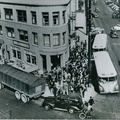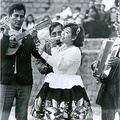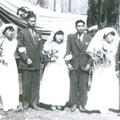Read Part 3 >>
Today, there are approximately 100 Japanese American families living in the Fowler vicinity. Only three families continue to farm as their main economic source. Approximately 90 percent of these families belong to the Buddhist Church where church-related activities seem to be the recognized unifying force in the community. However, many residents have voiced their concerns over the community’s future since increased education, lack of job opportunities, changing cultural values, interracial marriages, and greater social acceptance by the white dominant society have prompted the Sansei and Yonsei (third and fourth generation) to leave the confines of rural community life.
Each month the Fowler Buddhist Church has set aside a day of appreciation to commemorate the Issei. The women, whom I had interviewed, voiced their gratitude for the community’s recognition while at the same time expressing their concern that they should not become a burden on their children. Mrs. Abe murmured wistfully as she gently rubbed her arthritic knee. “I think next year I won’t be able to get around much,” she said, shaking her head unforgivingly. “It’s no good when you have to depend on your children for everything, neh?”
Mrs. Sato answered firmly, “Yes, we must gather our determination. Be able to do things for ourselves, neh?” She straightened her posture then proceeded to tell me about a man, named Nakamura, who lives in Japan. “He has no hands, no legs: He’s a daruma (a Buddhist saint who mediated nine years for enlightenment, after which his limbs had atrophied), but he does more with his mouth than those who have all their limbs.”
In spite of their increasing years, the women remained as active and useful as their physical constitution would allow. Rarely was an idle moment wasted. The women still awakened with the sun’s early rise, creating activities for themselves throughout the day: gardening, washing, cooking, sewing, crocheting, writing poetry, and the like. Only one of the women still lived in an extended family situation with her eldest son and daughter-in-law; the others resided in separate dwellings. According to the women, those arrangements were a matter of personal preference rather than one imposed upon them by their children, who visited them frequently, many living within a short walking distance. The daughter-in-law of one of the women came to visit her daily; cleaning her house; fixing meals; and taking her to the doctor’s office, grocery or department stores, or on an occasional trip to Reno.
One of the last questions I asked before convening my interviews with the women was whether they have any regrets about coming to America.
“No,” they unanimously replied without hesitation.
Mrs. Yamaguchi reflected, “I didn’t want to come…moving here and there, working hard, raising children… but if I stayed in Japan, I wouldn’t have become human.”
“Why?” I asked, not fully understanding the depth of her reply.
“Because she wouldn’t have suffered,” Mrs. Fujii answered for her matter-of-factly. “In Japan she could have done just as she pleased. Life would have been easy.”
All the women agreed that the hardship and suffering they had endured in America were necessary conditions for “becoming human.” To be “human” was not a quality bestowed upon one from the moment of birth, rather it was an attribute earned through experiential knowledge, a rite of passage realized after coming to America.
Compared to their counterparts who lived in urban areas,1 the lives of the Issei women in Fowler may have been more circumscribed because their rural environment hampered their physical mobility, restricted their ability to seek ties outside the family setting, confined them to employment within their families or the Japanese community, and impeded their English language facility. But despite these obstacles, they actively strove to improve the economic and social status of their children’s lives, while nourishing the spiritual conditions of their own. They had come to realize their own strength and to tighten their own resolve, always with the belief that many of life’s circumstances are determined by fate—shikata ga nai (it can’t be helped)—and with the recognition that in spite of the misery, hardship, or degradation, dobu no naka ni hasu no hana ga saku (in the midst of decaying matter, a beautiful lotus blossom grows).
Several of the interview sessions included the company of more than one Issei woman. In all cases, I was privileged to share with them many moments of laughter, sorrow, and warmth. The women had made me feel like I was coming home—to the reassuring smells of simmering rice, pungent soy sauce and magical herbs; to the familiar sounds of lyrical Japanese words and music, an unattended television set, an occasional barking dog, to the comforting feeling of a secret hiding place, a warm bowl of soup, and a loving and understanding mother. The women, themselves, gave little to this article: They called it Mukashi Banashi (Stories of the Past).
Notes:
1. See Evelyn Nakano Glenn, “The Dialectics of Wage Work: Japanese American Women and Domestic Service, 1905-1940,” Feminist Studies 6: 3 (Fall, 1980): 432-471.
© 2005 Akemi Kikumura Yano





